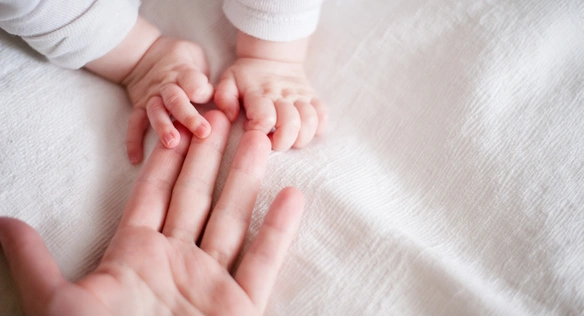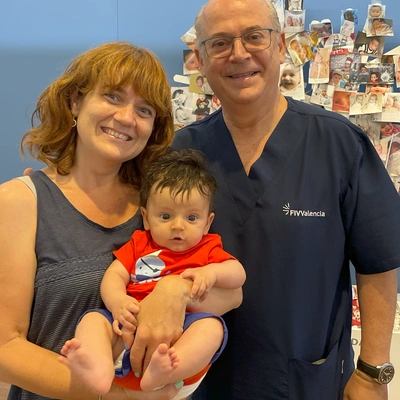IVF with donated eggs
Shared Gift, New Life – Let Donor Eggs Bring Your Dream of Parenthood to Life
In Vitro Fertilisation with donor eggs is an Assisted Reproduction treatment with the highest success rates. This procedure is one of the most effective options for individuals unable to achieve pregnancy naturally. It is recommended for cases such as women with a low ovarian reserve, premature menopause, or genetic diseases, among other conditions.
At FIV Valencia, we have our own egg donor bank. This allows us to carefully select the best donor for each patient and to provide you with the safety and assurance you need for your fertility treatment.
Our personalised medical diagnosis and the high standards of our laboratory are two key factors enabling us to achieve excellent results in our Assisted Reproduction treatments.
Who is Egg Donation IVF Suitable For?
Egg Donation IVF can be an effective solution for many individuals facing infertility. After a thorough diagnosis, your doctor at FIV Valencia will determine if Egg Donation IVF is the best option for you.
At FIV Valencia, every case is unique. We provide you with a personalised diagnosis and treatment plan tailored to your needs.
Egg Donation IVF is recommended in the following cases:

For more detailed information, visit our page on the causes of infertility. There you can learn more about the underlying factors affecting fertility and how Egg Donation IVF can help overcome them.
- Low Ovarian Reserve or Diminished Ovarian Function: From the age of 35, both the quantity and quality of eggs decline each year, significantly reducing the chances of achieving a healthy pregnancy with one’s own gametes. Egg donation is recommended for women over 40, even if they still have regular menstrual cycles.
- Primary Ovarian Insufficiency or Absence of Ovaries
- Genetic Abnormalities or Hereditary Diseases: Egg donation ensures that embryos are not affected by serious genetic conditions.
- Recurrent Miscarriages
- Failure in Previous Treatments: For cases with ovulation problems or poor ovarian response to stimulation, egg donation may be the best alternative.
- Repeated Implantation Failures




The Egg Donation IVF Process: How Does It Work?
Egg Donation IVF involves several key steps before, during, and after the procedure. The FIV Valencia team will guide you through every phase of your IVF treatment.
During your first visit, FIV Valencia offers a personalised fertility diagnosis. Through the Individualised Diagnostic Study (EDI), we will evaluate your and your partner’s fertility, examine your medical history, and develop a treatment plan tailored to your needs. This comprehensive approach ensures we recommend the best techniques to help you achieve your goal of becoming a parent.
Your donor will also undergo careful screening and various medical tests to ensure the highest safety for you and your future baby.
At FIV Valencia, our own egg donor bank allows us to select the most suitable donor for you. We consider your physical characteristics (hair colour, eye colour, skin tone, height, and blood type) to achieve the closest possible resemblance. All our donors undergo thorough medical and psychological assessments.
How Do We Select Our Egg Donors?
Our egg donors are young, healthy women who decide to help others become mothers by donating their eggs. At FIV Valencia, we prioritise the well-being of our donors and ensure they feel supported and valued throughout the donation process. In Spain, gamete donation is altruistic and completely anonymous. The identities of both the donor and the recipient family are fully protected.
Donors must meet specific physical and psychological criteria to be eligible. At our clinic, we adhere to strict standards, ensuring that all donors pass a rigorous selection process that includes:
- Medical Evaluation: Comprehensive blood tests, infectious disease screening (HIV, hepatitis, STIs), and genetic testing for conditions like cystic fibrosis and spinal muscular atrophy.
- Genetic Counselling and Testing: Donors’ family medical history is reviewed to ensure there is no risk of hereditary diseases.
- Psychological Evaluation: We ensure donors are emotionally prepared for the process and that their mental well-being is safeguarded.
The egg donor undergoes hormonal treatment to stimulate her ovaries to produce multiple eggs. Simultaneously, the recipient begins hormonal therapy to prepare the uterine lining (endometrium) for implantation. This process is monitored through gynaecological ultrasounds to ensure the uterus is ready to receive the embryo.
Once the donor’s eggs have matured, they are retrieved through a minimally invasive procedure under sedation. On the same day, the recipient’s partner provides a sperm sample for fertilisation, or previously frozen sperm is used.
After retrieval, the donor’s eggs are fertilised in the Assisted Reproduction laboratory using either the partner’s sperm or donor sperm. Fertilisation may be carried out through conventional IVF or, if necessary, Intracytoplasmic Sperm Injection (ICSI). The embryos are cultured in an incubator for 2 to 5 days, and our embryologists select the healthiest embryos for transfer.
Once the embryos have reached the optimal development stage, they are transferred to the uterus. The embryo transfer is a quick procedure performed in our clinic’s operating theatre under ultrasound guidance. A catheter is used to place the embryos directly into the uterus.
After the embryo transfer, it is recommended to rest for about 30 minutes at the clinic. Following this brief rest, you can resume your normal activities, though strenuous exercise should be avoided.
After the embryo transfer, your doctor may recommend progesterone supplements to maintain the uterine lining, ensuring the best conditions for the fertilised embryo to implant and to achieve a successful pregnancy.
About 14 days after the embryo transfer, a pregnancy test is conducted to confirm the outcome. The test measures beta-hCG levels in blood or urine. If positive, an ultrasound will be scheduled 7 to 10 days later to confirm the pregnancy.
What Should You Know Before Starting Egg Donation IVF?
Before starting Egg Donation IVF, your specialist at FIV Valencia will explain the process, required tests, potential risks, and key factors to maximise your chances of success.
At FIV Valencia, we provide psychological support services from day one. We believe emotional well-being during Assisted Reproduction treatments is crucial and can affect the outcome. Our psychology team will always be available for consultations and support throughout the process.
Pre-Treatment Tests for Women:
- Ovarian Reserve Testing: Evaluates your ovaries’ response to fertility medications by measuring anti-Müllerian hormone (AMH) levels via a blood test.
- Mock Transfer or Catheter Test: Ensures a smooth embryo transfer during your IVF cycle.
- Uterine Examination: A 3D ultrasound assesses uterine health and structure, ruling out abnormalities affecting implantation.
Pre-Treatment Tests for Men:
- Semen Analysis: Examines sperm count, motility, and morphology to determine if specialised techniques are needed for Egg Donation IVF.
Testimonials
Why Choose FIV Valencia for Egg Donation IVF?
At FIV Valencia, we combine cutting-edge technology with a patient-centred approach to provide the highest standard of care. Here’s why patients trust us:
Proven Expertise
Comprehensive Support
Advanced Techniques
In-House Egg Donor Bank
Emotional Well-being
Costs of Egg Donation IVF

The costs of Egg Donation IVF vary depending on your individual treatment plan, required tests, the need for sperm donation, and the freezing of unused embryos. The costs include donor selection, egg retrieval, fertilisation, embryo transfer, donor compensation, and medication.
For detailed information, consult our Price List.
IVF with Donated Eggs
FAQs
How long does the Egg Donation IVF process take?
The duration of Egg Donation IVF depends on the individual circumstances and the number of cycles required. At FIV Valencia, the process typically takes 6 to 10 weeks from the first visit to the embryo transfer. This period includes donor selection, ovarian stimulation, egg retrieval, fertilisation, and embryo transfer.
What is the age limit for Egg Donation IVF?
Egg Donation IVF is particularly effective for women over 40. At FIV Valencia, we offer this treatment to women up to 50 years of age.
What are the advantages of Egg Donation IVF?
Egg Donation IVF is the Assisted Reproduction treatment with the highest success rates. Its advantages include:
- High Success Rates: Especially for women of advanced maternal age or with a low ovarian reserve or egg quality.
- Solution for Repeated IVF Failures: Particularly when prior treatments have been unsuccessful.
- Genetic Testing Options: For hereditary conditions.
- Flexibility in Using Donor Sperm: If required.
- Suitability for Diverse Family Models: Including heterosexual couples, single women, and same-sex couples.
Is Egg Donation IVF safe?
Yes, Egg Donation IVF is a well-established and safe procedure. At FIV Valencia, both the donor and recipient undergo rigorous medical and psychological assessments to ensure safety throughout the process.
Are there emotional support services during treatment?
At FIV Valencia, we understand that undergoing fertility treatment can be emotionally challenging. That’s why we provide psychological support from day one, ensuring you feel guided and supported at every step.
How is the egg donor selected?
Our donors are selected from our in-house egg donor bank based on physical characteristics such as hair and eye colour, skin tone, height, and blood type to match the recipient. Donors undergo comprehensive medical, psychological, and genetic evaluations to ensure their suitability.
Can embryos be frozen for future use?
Yes, any high-quality embryos not transferred during the current cycle can be cryopreserved for future treatments, offering flexibility for subsequent pregnancies.



